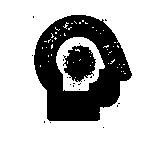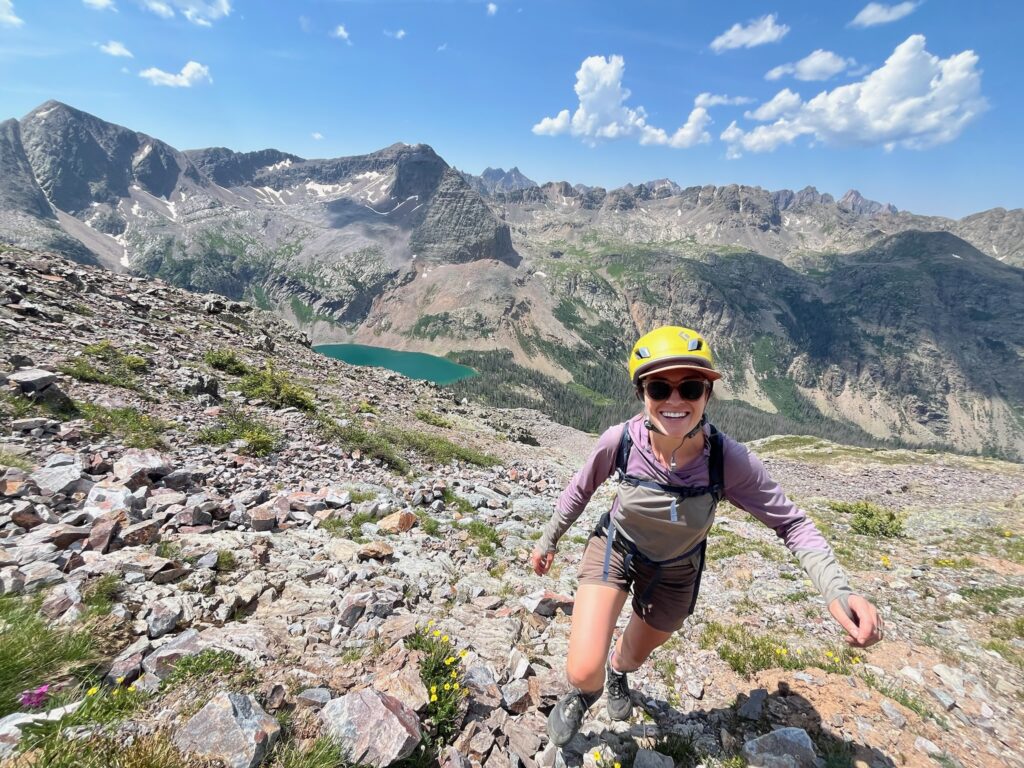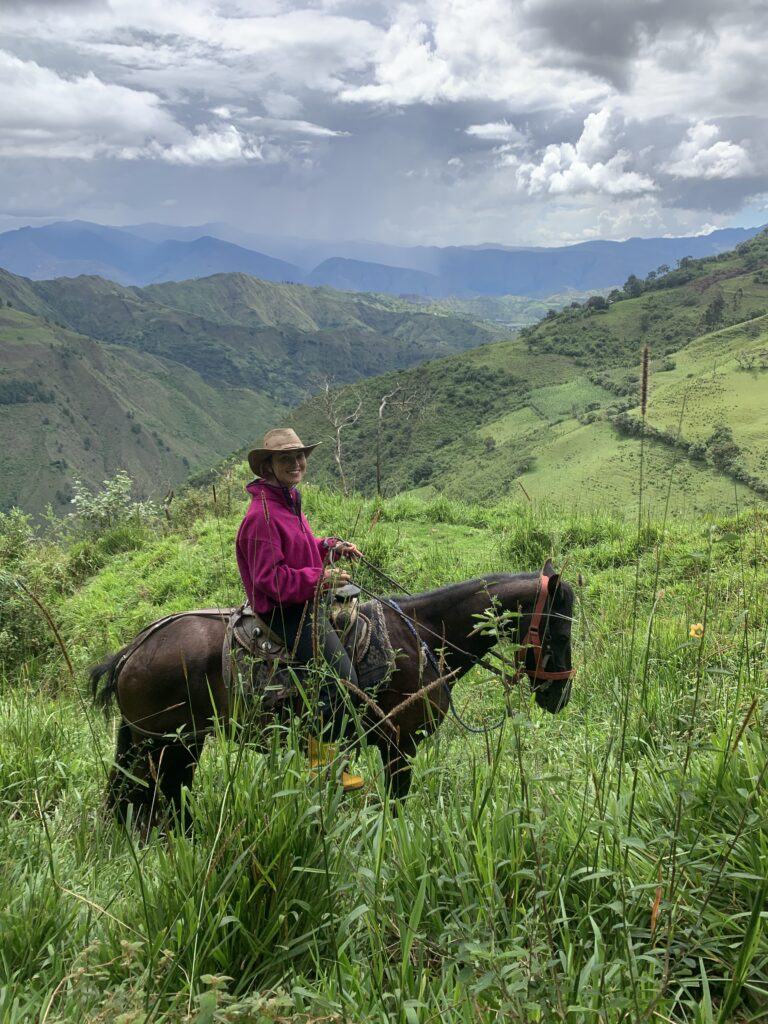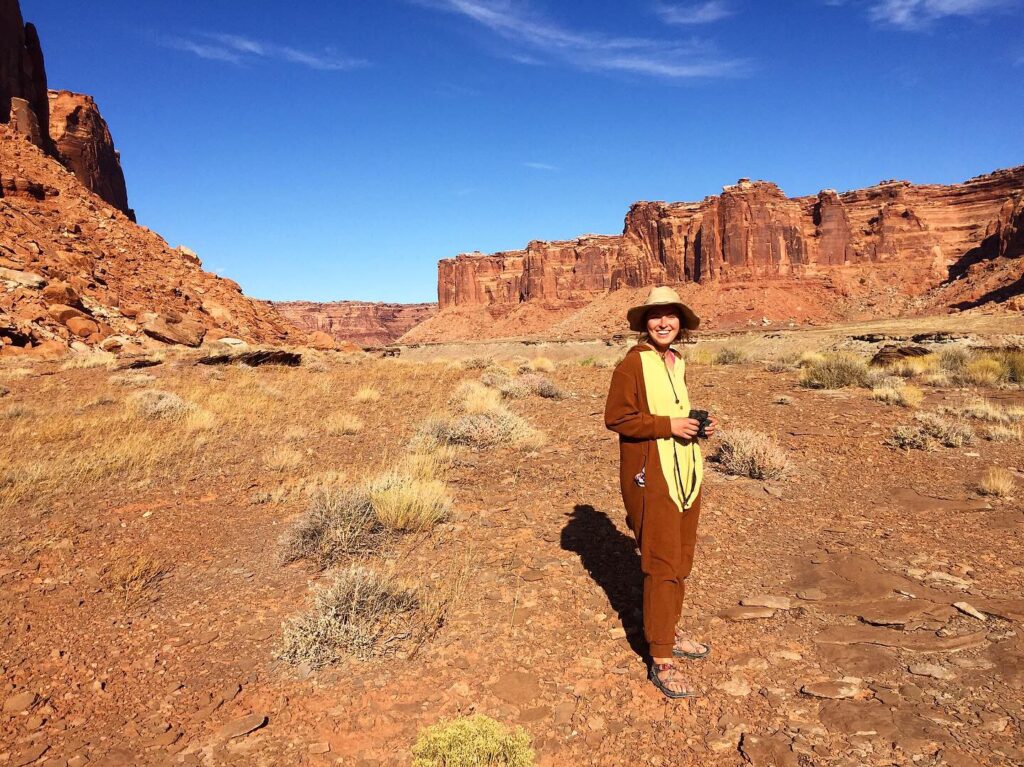
Emily Riggs
LSW, LAC (CO), C-IAYT (Certified Yoga Therapist)
she/her

My approach is …
unique and individualized, grounded in traditional modes of healing combined with new emerging research and modalities.

The heart of my practice is the core belief that…
Behind our layers of protection and wounding is our true essence. My goal is to work with clients through a variety of methods to identify and embody this essence.

I help clients to …
identify their core values, which will inform the work we do together. In addition, the core values that I bring to the table are… Authenticity, balance, curiosity, compassion, and humor.

Highlights









APPROACH & FRAMEWORK
I’m an attunement & authentic connection-based therapist who works with the whole person (body-mind-spirit). I pull from western psychology theory, and more eastern traditions, such as Buddhist meditation principles, Ayurveda, and Yoga. I integrate my training and background in Posttraumatic Growth somatic therapy, yoga therapy, and motivational interviewing to provide a unique and individualized approach, grounded in traditional modes of healing combined with new emerging research and modalities.
My work is informed by both my own personal experiences managing and recovering from PTSD and chronic stress, and training with amazing trainers like Southwest Trauma Training. My professional background includes time in wilderness therapy and the justice system, both experiences informing some of the values I bring into my work.
My time in wilderness therapy showed me the value of gently and non-invasively breaking down barriers and conditioning to allow folks to reemerge as their most authentic selves. My time in the criminal justice system taught me the value of seeing past our most shameful actions to see the underlying needs of each person.
I work with the nervous system of my clients on a somatic level to work towards deactivating stuck patterns and allowing more regulated presence to arise. On a cognitive level, I utilize motivational interviewing to elicit and strengthen motivation and commitment for change that clients are desiring. I cultivate an atmosphere of authenticity, compassion, and accountability. For clients interested in yoga therapy, I integrate this with other modalities for a multi-faceted approach.
Empowering individuals to progress toward improved health and well-being through the application of the teachings and practices of Yoga. (International Association of Yoga Therapists) Yoga therapists curate Yoga & Ayurvedic teachings and techniques to address an individual’s presenting challenges, collaborating with the client to form a personalized and evolving treatment plan. Yoga therapy can benefit any person, any body, any skill set, and any experience level. It is not about doing the best headstand, but rather it is a therapeutic modality that operates on the physical, energetic, mental/emotional, and spiritual dimensions to help the client and provider work towards restoring balance and whole health.
“MI is a collaborative, goal-oriented style of communication with particular attention to the language of change. It is designed to strengthen personal motivation for and commitment to a specific goal by eliciting and exploring the person’s own reasons for change within an atmosphere of acceptance and compassion.” (Miller & Rollnick, 2013) Understanding Motivational Interviewing
|I use MI as the foundation for my therapy with all clients. Using tools like reflecting, summarizing themes, asking thought-provoking questions, and affirming points of strength. I commit fully accepting and embracing each client as they are, while also evoking and exploring their internal motivations for change. MI serves as a solid base on which the client and I can co-create an individualized treatment plan using other modalities (somatic, yoga, values-based, CBT/DBT, etc.) that best suit their unique needs, backgrounds, and personalities.
“Being able to feel safe with other people is probably the single most important aspect of mental health; safe connections are fundamental to meaningful and satisfying lives.” –Bessel Van Der Kolk, The Body Keeps the Score
I use the Posttraumatic Growth framework to help clients move towards resilience while recovering from or actively dealing with stress or trauma. Some of the skills I will practice with clients to move towards Posttraumatic Growth include orientation to one’s environment/surroundings, regulating breath work, “Taking in the Good”, self-compassion practices, and gratitude. These practices are further explained and described in the Resilience in Difficult Times PDF.
Top Approaches
Buddhist philosophy Cognitive Behavioral Therapy (CBT) Harm Reduction Contemplative & Mindfulness-Based Approaches Compassion-Focused Culturally Affirming/Responsive Dialectical Behavioral Therapy (DBT) EcoTherapy, Nature-based Feminist perspective Group Therapy Harm reduction
- Acceptance and Commitment Therapy (ACT)
- Addiction Counseling
- Anger Management Therapy
- Attachment-Based Therapy
- Breathwork, Qigong
- Buddhist Philosophy
- Client-Centered Therapy
- Coaching
- Cognitive Behavioral Therapy (CBT)
- Cognitive Behavioral Therapy – Insomnia (CBT-I)
- Compassion-Focused Therapy (CFT)
- Contemplative & Mindfulness-Based Approaches
- Contemplative Psychotherapy
- Couple and Family Systems Therapy
- Couples Counseling
- Culturally Responsive/Affirming Therapy
- Culturally Sensitive Therapy
- Culturally-Responsive & Culturally-Sustaining Therapy
- Dialectical Behavior Therapy (DBT)
- Ecotherapy
- EcoTherapy, Healing in Nature
- Family Systems Therapy
- Feminist Therapy
- Forensic Psychology
- Gender-Affirming Care
- Gottman Method
- Group Therapy
- Harm Reduction
- Holistic Health
- Holistic Therapy
- Humanistic Therapy
- Integrative Therapy
- Internal Family Systems (IFS)
- Interpersonal Therapy (IPT)
- Intuitive Eating
- Liberation Psychology & Decolonial Approaches
- Metacognitive Therapy (MCT)
- Mindful Self-Compassion (MSC)
- Mindfulness Based Cognitive Therapy (MBCT)
- Mindfulness Based Therapy or Stress Reduction
- Mindfulness or Meditation
- Mindfulness Practices
- Motivational Interviewing
- Narrative & Strength-Based Approaches
- Narrative Therapy
- Nature-Based & Ecotherapy Approaches
- Non-Violent Communication (NVC)
- Person-Centered Therapy
- Polyvagal Theory
- Relational Therapy
- Self-Compassion Focused Therapy
- Social Justice-Oriented Therapy
- Solution-Focused Brief Therapy (SFBT)
- Somatic & Body-Centered Therapies
- Somatic Therapy
- Somatic Therapy (Body Centered)
- Somatic Therapy or Healing
- Spiritual Healing Practices or Psychology
- Strength-Based Therapy
- Supportive Therapy
- Talking Circles (Indigenous Practice)
- Tapping & Emotional Freedom Technique
- Therapeutic / Mindful Movement
- Therapeutic Journaling
- Therapeutic Yoga
- Transpersonal Therapy
- Trauma-Focused Therapy
- Trauma-Informed & Trauma-Responsive Care
- Walk and Talk Therapy
- Wellness Recovery Action Plan (WRAP)
- Wilderness Therapy
- Yoga Therapy
AREAS OF CARE
I love working with folks that are open or curious about working with the body. I know this can be very intimidating for some! But I find that a little openness or curiosity can go a long way, and I love being part of the process while someone learns to listen to and trust what their body is telling them. Though I do enjoy modes of talk therapy and find they can be incredibly helpful, I have witnessed somatic therapy to be more efficient and expansive in its impact.
“Trauma victims cannot recover until they become familiar with and befriend the sensations in their bodies. Being frightened means that you live in a body that is always on guard. Angry people live in angry bodies. The bodies of child-abuse victims are tense and defensive until they find a way to relax and feel safe. In order to change, people need to become aware of their sensations and the way that their bodies interact with the world around them. Physical self-awareness is the first step in releasing the tyranny of the past.” -Bessel Van Der Kolk, The Body Keeps the Score
I believe that both trauma and healing occur in the body, as well as the mind. Using somatic and yoga-based therapies, I can work with clients to move towards Posttraumatic Growth.
“There is deep wisdom within our very flesh, if we can only come to our senses and feel it.” -Elizabeth A. Behnke
“Traumatized people chronically feel unsafe inside their bodies: The past is alive in the form of gnawing interior discomfort. Their bodies are constantly bombarded by visceral warning signs, and, in an attempt to control these processes, they often become expert at ignoring their gut feelings and in numbing awareness of what is played out inside. They learn to hide from their selves.” -Bessel Van Der Kolk, The Body Keeps the Score
In applying Polyvagal Theory, the nervous system serves as the foundation for understanding trauma and healing because it regulates our physiological and emotional responses. When an individual experiences trauma, the nervous system can become dysregulated (see chart below). This dysregulation affects physiology, behaviour, emotions and relational capacity. By recognizing the role of the nervous system, therapy can begin to address the underlying nervous system functioning to move beyond “managing” to actually shifting the physiological state. The shifting of physiological state is the portal into deeper changes in all areas of life, leading to symptom reduction, as well as growth and a sense of wholeness. ” -Ruby Jo Walker, Southwest Trauma Training
Top Areas of Care
Attachment/intimacy Anger management Anxiety Balance Boundaries Communication skills Chronic or acute stress Core beliefs
- Abandonment
- Abuse (General)
- ADD/ADHD
- Addiction
- Addiction (General)
- Addiction and Substance Use
- Adjusting to Change
- Adjustment Disorders
- Adolescent / Teen Issues
- Adoption
- Adulting (Young‑Adult Life Skills)
- Adverse Childhood Experiences
- Aging & Geriatric Concerns
- Aging Parents
- Aggression & Violence
- Agoraphobia
- Alcohol Use
- Alcohol Use Disorder
- Anger
- Anger / Anger Management
- Anger Management
- Anorexia Nervosa
- Antisocial Personality
- Anxiety
- Anxiety (General & Death Anxiety)
- Assertiveness
- Attachment Issues
- Atypical Personalities
- Behavioral Issues
- Bipolar Disorder
- Bipolar Disorder / Patterns
- Bisexual
- Body Dysmorphia
- Body Image
- Body Image Issues
- Body Positivity
- Body Positivity / Neutrality / Acceptance
- Body‑Focused Repetitive Behavior
- Borderline Personality (BPD)
- Borderline Personality Disorder
- Burnout
- Cannabis Use
- Children of Parents with Addiction
- Chronic Illness
- Chronic Illness & Pain
- Chronic Impulsivity
- Chronic Pain
- Chronic Relapse
- Climate Anxiety
- Codependency
- Commitment Issues
- Commitment Obstacles
- Communication Issues (Couples & General)
- Community, Diversity & Social Justice
- Complex Trauma / C‑PTSD
- Compulsive Behavior
- Conflict Resolution
- Coping Mechanisms / Coping Skills
- Coping Skills
- Counterdependency
- Couples / Marriage / Relationship Issues
- Couples Communication Skill‑Building
- Criminal Justice / Forensic Issues
- Cultural & Systemic Oppression
- Cultural Adjustment & Resistance
- Cultural Competence
- Dating
- Dating Issues
- De‑Gaslighting & Boundary Setting
- Depression
- Developmental & Attachment Trauma
- Developmental Disorders
- Disordered Eating & Food Relationships
- Dissociative Disorders (DID)
- Domestic Abuse
- Domestic Abuse / Violence
- Domestic Violence
- Dread
- Drug / Substance Use
- Drug Abuse
- Dual Diagnosis
- Ecological Grief
- Emotion Regulation (overwhelm, shutdown, expression)
- Emotional Disturbance
- Emotional Intelligence
- Emotional Overwhelm / Flooding
- Emotional Shutdown / Expression
- Existential Crisis & Meaning
- Existential Crisis or Transition
- Family Conflict
- Family Dynamics
- Family of Origin Issues
- Fear
- Fear of Failure
- Forgiveness
- Gaslighting
- Gender Identity
- Goal-Setting
- Goal‑Setting & Productivity
- Grief
- Grief & Loss
- Grief and Bereavement
- Highly Sensitive Person
- Houseless / Unhoused People & Displacement
- Identity Issues
- Identity Issues & Self‑Exploration (combined)
- Impulse Control Disorders
- Incarceration & Re‑Entry
- Indecision
- Indigenous & First‑Nations Issues
- Inner Critic / Superego / Self‑Persecutory Issues
- Insomnia
- Intergenerational & Historical Trauma
- Intimacy
- Intrusive Thoughts
- Irritability
- Isolation / Loneliness
- Jealousy & Rejection
- LGBTQ+
- LGBTQIA-Related Stress
- Life / Wellness / Productivity Coaching
- Life Coaching
- Life Purpose
- Life Transitions
- Life Transitions (General)
- Life‑Purpose Coaching (duplicate kept for nuance)
- Loneliness
- Maladaptive Personality Patterns
- Masculinity-Related Stress
- Meditation & Mindfulness (practice)
- Men’s Issues
- Military / Combat Trauma
- Military / Service Members / Veterans
- Mind‑Body Connection
- Mood
- Mood Disorders
- Mood Issues / Mood Disorders (General)
- Narcissistic Personality (NPD)
- Nutrition Concerns
- Obsessive Thoughts & Behavior (OCD‑related)
- Oppositional Defiance (ODD)
- Oppositional Defiant Disorder (ODD) / Demand Avoidance (PDA)
- Panic Attacks / Panic Disorder
- Peer Relationship Issues
- Peer Relationships
- Performance Anxiety
- Personality Disorders
- Personality Disorders (General)
- Phobias & Fears
- Political Climate Stress
- Positive Psychology & Strength‑Based Approaches
- Post‑Traumatic Stress Disorder (PTSD)
- Power Dynamics (Relationships with power differentials)
- PTSD / Post‑Traumatic Stress Disorder
- Race-Related Stress
- Racial Stress & Trauma
- Racial, Ethnic & Cultural Identity
- Racism, Oppression & Discrimination
- Relationship Coaching
- Relationship Issues
- Relationships (General)
- Romantic Life
- Seasonal Affective Disorder (SAD)
- Self Esteem
- Self‑Actualization
- Self‑Care
- Self‑Compassion
- Self‑Criticism
- Self‑Doubt
- Self‑Esteem
- Self-Reflection
- Sense of Meaninglessness
- Sensitivity / Sensitivity to Criticism
- Sensitivity to Criticism
- Shame & Guilt
- Shame, Self‑Esteem & Insecurity
- Skills Groups
- Social Anxiety
- Social Justice
- Somatization
- Spiritual Coaching
- Spiritual Crisis or Transition
- Spirituality
- Spirituality (General)
- Stress
- Stress (general & work‑related)
- Substance Use
- Substance-Related & Addictive
- Trauma
- Trauma and PTSD
- Trauma‑Focused Therapy / Resiliency
- Trust Issues
- Values Clarification
- Veteran-Related Stress
- Veterans
- Vulnerability
- Women’s Issues
- Women’s Obstacles
- Work Stress & Work–Life Balance
- Worthlessness
- Young Adult / Early‑Career Issues]\Young Adulthood
Q & A
I value authentic, grounded, highly attuned connection with my clients. I’ve been told I balance gentleness and directness well and have a knack for interchanging depth and playfulness. I seek to find points of strength and resilience in my clients and believe I have a good eye for this, which leaves clients feeling empowered, respected, and seen. I am inquisitive and like to unfold layers to present both myself and the client with deeper understanding.
I grew up in the 1990’s and early 2000’s at the intersection of the midwest and Appalachia regions in a family unit where mental illness was rampant. At this point mental health was still a highly stigmatized discussion topic. Throughout my adolescence and into my young adulthood, I was unknowingly surviving in the world with a highly dysregulated, chronically stressed, hypervigilant and dissociative nervous system. Through many hours of various therapies, personal spiritual work, and valuable time spent in the wilderness and with people that cared about me, I’ve gradually transformed (ongoing process) my symptoms of chronic stress and PTSD into embodiments of Posttraumatic Growth. I’ve harnessing the gifts that my trauma has given me while also working towards a more regulated nervous system. The freedom that comes from feeling more and more ease and joy in the world propels me into impassioned clinic work with others who feel stuck in patterns of dysregulation or stress. I move towards modalities that I’ve either felt the most impact from personally or seen the most impact from in others. I move away from modalities that have been insignificant in impact for me or others I’ve worked with or know personally.
I enjoy having been trained in a variety of differing modalities, ranging from Cognitive and Dialectical Behavioral therapies to Somatic and Yoga therapies. While my expertise is helping folks move towards their authentic essence, and recover from chronic stress, developmental wounding, and trauma, I know that people are so diverse, preferring or suiting best with different routes of healing. When getting to know a new client, I decide on what modalities to utilize based on their personal preferences combined with my own attunement to what the individual is bringing to the table.
While “success” is different for each client, I love hearing clients say they are feeling more like themselves. I love seeing people feel more attuned to their own bodies and their own resilience. I love seeing clients become aware of and begin overcoming limiting core beliefs and grow in their capacity for self-compassion, self-efficacy, and/or empathy for others.
If you are someone who is looking to relieve dysregulation in the nervous system… this could include but is not limited to: depression, anxiety, insomnia, addictive or impulsive behavior, attention issues, anger management challenges, irritation/frustration with loved ones, impatience, dissociation, disembodiment, social anxiety, overthinking, shame, helplessness, and much more… and are open or curious about integrating some somatics (mindfulness, somatic therapy, or yoga therapy), it could be a good fit!
COMMUNITY & CULTURE
People with PTSD diagnoses or history of trauma leading to symptoms of PTSD.
This includes but is not limited to:People with a history of sexual trauma
Veterans
People with a history of homelessness
People with racialized trauma
OUTSIDE THE SESSIONS
Community – I feel fortunate to have landed in a unique and dynamic community, full of many others who work in the therapeutic realm, enjoy the wilderness, and share many common values. I am part of a regularly meeting Women’s Circle, and feel most alive in life when surrounded by strong, compassionate, and spirited women.
Wilderness – Nestled at the intersection of high mountain alpine and desert canyons, I find the most connection to self, others (so many friendships enriched by time in wilderness), and the mystery of the world when I am losing track of time in the wilderness. I enjoy seeking out pools to plunge in, hiking until my body tires, and sitting around a campfire for hours.
Yoga & Meditation Practice – I stumbled upon yoga and meditation around the same time, as a fatalistic, disembodied and regularly dissociating, chronically stressed 17 year old. At the time, I was living in a house still rampant with volatility, and constantly on the run trying to evade my own pain. I found the audiotapes of Ekhart Tolle’s Power of Now in the back of my mom’s closet, and began listening each night in candlelight, gazing out at the stars. Shortly thereafter I attended my first Ashtanga yoga class. I would later realize the relief I felt in going to yoga was largely from the way the practice allowed my body to melt out of frozen holding patterns, derived from chronic stress and trauma. Both meditation and yoga allowed me to reconnect with my true self, instead of the defense mechanisms I had acquired over the years and taken on as my identity. Over the next 15 years, my studies and practice of yoga and meditation have provided me with the opportunity to continue shedding layers of habitual patterning, and become reacquainted with my authentic essence.
Reading – I enjoy reading anything by adrienne maree brown, Octavia Butler, or Martin Prectel. I also love steamy high-fantasy escapes, historical fiction, and speculative science fiction.
My amazing partner, Chris – I met my partner Chris shortly after moving to Southwest Colorado in 2017. I am perpetually amazed by the lessons, gifts, challenges, and inspiration I receive by loving someone deeply. Though my favorite way to spend time together is goofing around and allowing the most ridiculous sides of ourselves to come out together, I love that he too shares such a strong affinity for what I cherish most in life (listed in the bullets above).
Soccer!! – I joined an adults’ league a couple years ago and find it to be the most fun and connecting way to spend my time.
Travel – particularly to Latin American countries, as I am working on learning Spanish and enjoy immersing in vibrant Latin culture
Gardening – a very grounding, ever-evolving science experiment
Biking – E-bike commutes, Mountain Biking
Backcountry skiing – I like to move slowly and get out in the winter mountains with friends
Dance – West Coast Swing, Contact Improv, Fusion dance…
Making indulgent homemade drinks – affogatos, spicy chai, kombucha, Mate, Cold Brew coffee, hot cacao, the list goes on and on…
Loyal, discerning, goofy, grounded, perceptive, caring, and passionate
EDUCATION/TRAINING
Master’s in social work: Colorado State University (December 2024)
Licensed Addiction Counselor (February 2025- Application in process)
Bachelor of Recreation Studies: Outdoor Education (December 2015) – Patton College of Education, Ohio University, Athens Ohio
Post-traumatic Growth Somatic Therapy Certificate, Additional Advanced Training SW Trauma Training
200 Hour Yoga Teacher Training (January 2019)
800 Hour Yoga Therapy Certificate, Inner Peace Yoga Therapy (Current student, 600+ hours complete)
National Outdoor Leadership School, Outdoor Educator Course in Yukon, Canada (July-August 2015)
Wilderness First Responder, Wilderness Medicine Institute
PROFESSIONAL INTERESTS AND PROJECTS
RJ facilitation & CJ Diversion/Reform, mediation I am committed to contributing to local, state, and federal Criminal Justice diversion and reform efforts. What this currently looks like is supporting my community’s local Restorative Justice coalition, Southwest Community Justice Coalition. My time with SCJC includes For those that are interested, here is a link to the organization I am working with: Southwest Community Justice Coalition
Having spent 4.5 years working in Community Mental Health, I believe some of the folks with the highest need of high quality mental health care are getting some of the most elementary care. I would like to see more cutting edge, high quality mental health care being offered to the most at-risk populations. I would like to see more somatic practices offered in these settings to complement cognitive and behavioral therapies.
Why are you invested in it?
My time as a social worker and yoga teacher at the Durango County jail awakened a passion and deep-rooted concern for those navigating the criminal justice system. While the four and a half years of this work proved wondrously fulfilling in serving the most simultaneously vulnerable and resilient populations I have encountered, I remain acutely aware of the limits to the impact one can have while serving incarcerated folks in a one on one or group setting. I feel an insatiable itch to be a part of something more. As I dive deeper into clinical one on one and group work, a true love of mine, I seek to continue building a parallel career in contributing to the transformation of our justice system (at a local, state, and federal level) into a more rehabilitative, equitable, and just paradigm.
TA’ing with Southwest Trauma Training
Furthering Yoga Therapy field credibility & accessibility
International Association of Yoga Therapists (IAYT)
SHARES
In An Unspoken Voice: How the Body Releases Trauma and Restores Goodness by Peter Levine
Resilient: How to Grow an Unshakable Core of Calm, Strength, and Happiness by Rick Hanson Ph.D and Forrest Hanson
The Body is Not an Apology: The Power of Radical Self-Love by Sonya Renee Taylor
The Wise Heart: A Guide to the Universal Teachings of Buddhist Psychology by Jack Kornfield
Living Beautifully with Uncertainty and Change by Pema Chodron
Pleasure Activism: The Politics of Feeling Good by adrienne maree brown
In the Realm of Hungry Ghosts: Close Encounters with Addiction by Gabor Mate
Daily Reflections on Addiction, Yoga, and Getting Well by Rolf Gates
TESTIMONIALS
“Working alongside Emily Riggs has been a true privilege. With a background as both a wilderness therapy guide and jail-based therapist, she brings a grounded, embodied approach to her work that’s deeply trauma-informed and rooted in social justice. Her skill in blending CBT, DBT, somatic practices, yoga therapy, and nervous system regulation creates a space where clients feel seen, empowered, and safe to do meaningful work. She has a rare ability to navigate conflict with clarity and compassion, and consistently advocates for her clients with unwavering integrity. Intuitive, steady, and deeply attuned. She brings a calming presence into any room, and clients often reflect how deeply seen and safe they feel in her care, Emily is not only a skilled clinician but a powerful healing presence in any setting.” -Katie Wagner, LSW, LAC, former colleague
“Emily is not just a competent practitioner but a transparent one who will answer all your questions and help you feel at ease in moments of discomfort whether tending to pain in your body or your heart, or both at once. Confident, knowledgeable, and humble, she listens and creates coherent and relevant exercises plans to aid in your healing. Couldn’t recommend her more!” -Ruthie, Previous Yoga Therapy client
“Emily is a very passionate, down to earth, and caring therapist. She has a very grounded energy that makes her clients feel safe and comfortable. Emily prioritizes somatic and nervous system practices to help people reconnect with their bodies. Emily makes therapy relatable and fun, while taking feedback from clients on how to get the most out of their sessions. She views therapy from a social justice lens, often advocating for clients who experience oppression or other forms of discrimination. Emily isn’t afraid to speak up for her clients and help them navigate systems and find solutions to their problems.” -Chelsea Steck, LCSW, LAC, former colleague
